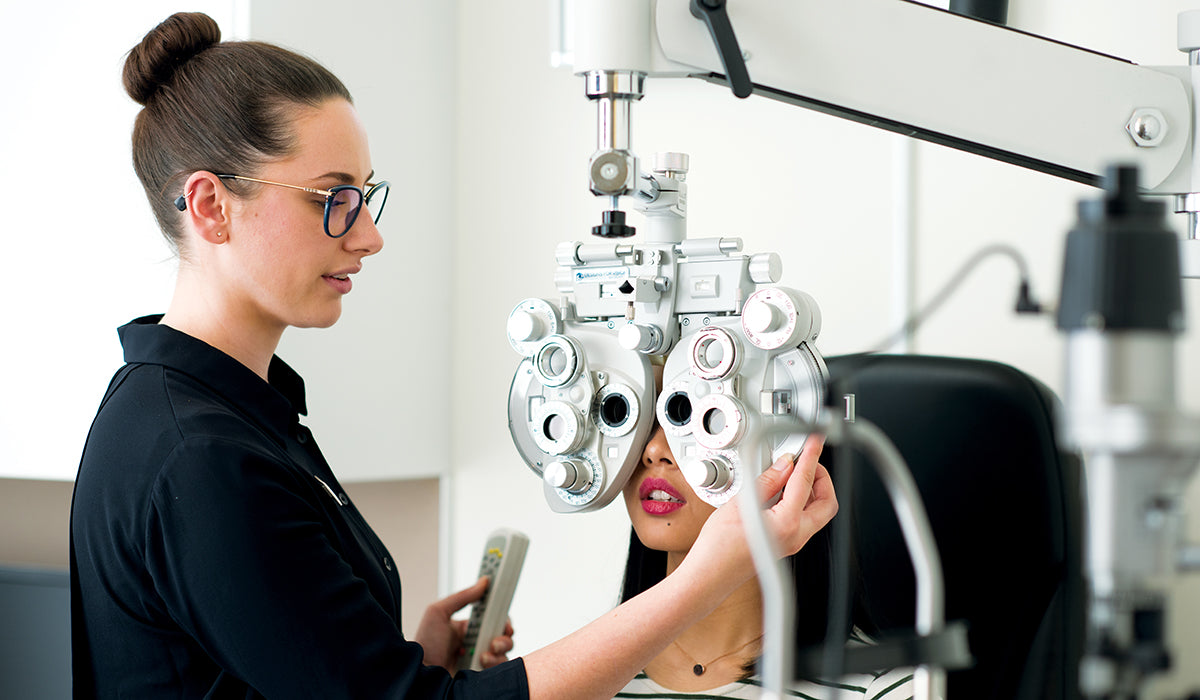The challenge of double vision

Just as the name suggests, double vision or seeing double is where you see two images instead of one. The technical term is diplopia, and it can happen in one eye or both. Double vision can have a big impact on your life, it can affect your ability to exercise, drive and read to say the least.
There can be many reasons people see double, sometimes it’s temporary and nothing to worry about. Other times it’s linked to an eye condition or is a sign of something more serious. Either way if you’ve got double vision it’s important to book an eye test to get it checked out.
Symptoms of double vision
While seeing double is the symptom, some people also have:
- pain inside or around the eye
- a wandering eye or look cross-eyed
- headaches
- nausea
- droopy eyelids
What does vision with double vision look like?
Click and drag the image below to see how double vision can affect your vision.
Healthy vision
Causes of double vision
There can be many reasons a person sees double and it can take some time and tests to find the root of the problem.
Monocular diplopia
Seeing double with one eye is known as monocular diplopia.
A simple test to work out if you have this is to cover the good eye, if you still have double vision when you look through the bad eye – it’s monocular diplopia. It’s less common than double vision in both eyes and is often less serious.
Possible causes include:
- Astigmatism
- Keratoconus
- Pterygium
- Cataracts
- A dislocated lens
- Swollen eyelid
- Dry eye
- Retinal problems
Binocular diplopia
When both eyes aren’t working together properly, causing double vision, it’s called binocular diplopia.
You can easily test whether the double vision affects one eye or both by covering one of your eyes. If the double vision goes away, it’s binocular diplopia.
It can be caused by:
- Strabismus (turned eye or eyes)
- Nerve damage
- Trauma to the eye muscles
- Diabetes
- Myasthenia gravis (a neuromuscular disorder)
- Graves' disease (an immune system disorder)
Treatment
If double vision comes on suddenly, you should see a doctor to ensure it’s not a sign of something serious like a brain tumour or aneurysm. Depending on the cause, double vision is commonly treated with glasses, contact lenses, an eye patch, eye exercises, surgery, medication or by treating any contributing medical conditions.

We're here to help
If you’re seeing double, you need to book an eye test as soon as possible to find out the cause. Your optometrist might be able to find and treat the cause or refer you to a specialist.
You might also like to read...
View all-
Understanding astigmatism
There’s a good chance you’ve heard of astigmatism before. It’s a common eye condition that causes blurred vision, discomfort in your eyes and headaches.
Eye conditionsUnderstanding astigmatism
There’s a good chance you’ve heard of astigmatism before. It’s a common eye condition that causes blurred vision, discomfort in your eyes and headaches.
Read more -
Learning more about cataracts
You’ve probably heard of cataracts – when the normally clear lens of the eye becomes cloudy. It happens because the lens becomes hardened, and it means a gradual decrease in...
Eye conditionsLearning more about cataracts
You’ve probably heard of cataracts – when the normally clear lens of the eye becomes cloudy. It happens because the lens becomes hardened, and it means a gradual decrease in...
Read more -
The ins and outs of colour deficiency
You might know colour deficiency by its other name – colour blindness. This name isn’t technically correct, as most people living with colour deficiency can actually still see colours.
Eye conditionsThe ins and outs of colour deficiency
You might know colour deficiency by its other name – colour blindness. This name isn’t technically correct, as most people living with colour deficiency can actually still see colours.
Read more





